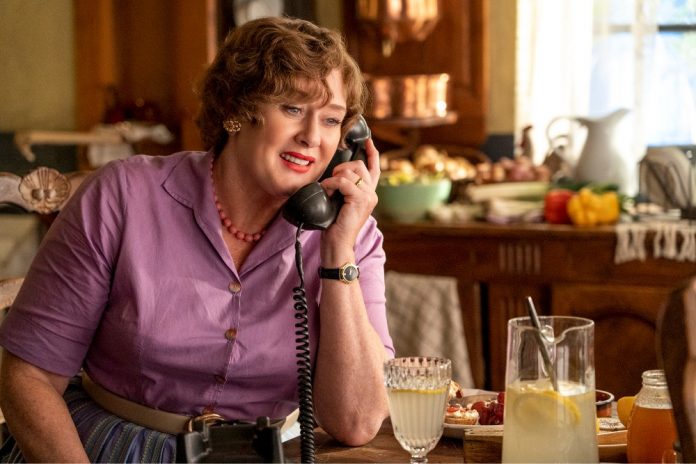Following its successful eight-episode first season in the spring of 2022, Julia is back on Max for another eight-episode run. Sarah Lancashire stars as the incomparable Julia Child, who at the start of Season Two is in France with her husband Paul (David Hyde Pierce), as her colleagues back at WGBH try to fill the time until she returns to Boston.
Above the Line had the chance to speak with creator Daniel Goldfarb and showrunner Chris Keyser the morning after the SAG-AFTRA strike officially ended, when they were flying high on being able to have their actors talk about the show again ahead of its launch. They described the convenient timing of filming and post-production that enabled them to finish the season without any delays and to enjoy themselves in France while doing it.
Goldfarb and Keyser, who first worked together on FX’s Tyrant nearly a decade ago, had positive memories of the shooting process to share, as well as their delight with how the second season will be rolling out on Max, with one episode dropping per week following the first three and running through the winter holidays, a perfect time to enjoy their delightful series.
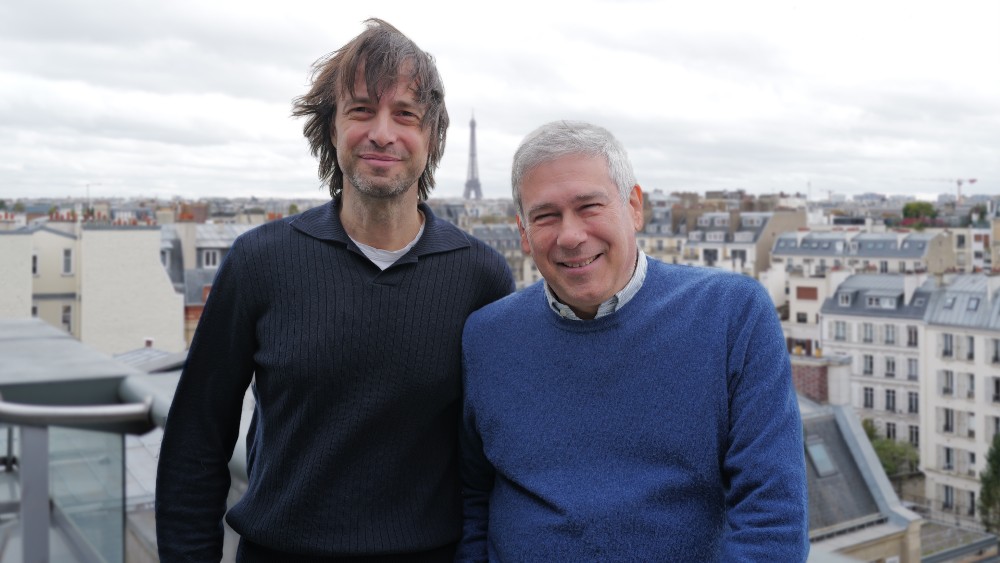
Above The Line: We spoke a year and a half ago, and I asked if you planned for this to be a limited series and you said, “No, what are you talking about? We want to get renewed, we want to do more!” So I am very happy to be speaking with you again, and I assume you’re just as excited to talk to me, because you said you were already working on Season Two even before the renewal.
Daniel Goldfarb: Correct.
ATL: So it’s been about a year and a half. In this post-pandemic and post-strike world, how does it feel to be coming back after that amount of time off-air?
Goldfarb: It feels great. And then the news last night [of the actors strike ending] makes it even greater that we can all celebrate together. We wrapped in December of last year. We were very lucky creatively, because we finished post-production in the middle of April, so the show wasn’t creatively affected by the strikes at all. Here we are in the fall and around the holidays, and, as anxious as I’ve been to share it with everybody, it actually feels like a perfect time for the world to share the show with everybody. It feels great.
ATL: And you now have the support of the cast to talk about it. I imagine that promoting it on your own, there’s a certain burden that doesn’t quite feel right.
Chris Keyser: Yes, it’s nice to share all of this. We made it together. We should talk about it together.
ATL: So what can you tell me about your approach to Season Two as compared with Season One?
Keyser: Well, one thing is we were freed from the burden of having to start the story from scratch, and obviously to introduce characters, which is fun but takes some time, but also to get Julia to the point where she was making The French Chef, and that second act in her life had begun. It was fun to do that. That was the drama and comedy of that story. The great thing about the second season is that all of those obligations are gone, so we have eight full episodes to tell a story, and it’s necessary, also, because you have to give an audience what they got before and more. And we now have the time to do that, to start running. We began as we had promised to begin at the end of Season One, the way we wanted to do in Season One anyway, in France, back where Julia began her culinary journey, where she and Paul had lived for all of those years. That was really important to us, just emotionally for the two of them and for the scope of the show. It gave us a real opportunity to expand the show.
One of the obligations, I think, that we felt was to give the show broader horizons. It’s true in many ways. Julia becomes much more important in this season than she did before. She’s really famous. Fame itself brings changes, but it also reinforces your desire to connect with where you started, and these questions about where you began and who you were and what secrets follow you through your life and how you leave the past behind and the extent to which you embrace the new. Remember, we’re now smack dab in the middle of the sixties and 1965. The pace of change in the United States and the world, culturally and politically, is kicking into high gear, and Julia’s got to figure out how to deal with it. She’s got to figure out about all the changes that she herself is causing. She’s the center of gravity, and she’s sending, I know this is physics and doesn’t make any sense, shockwaves throughout the world all around her by being so famous. All of those things were the things we wanted to do. What am I forgetting, Daniel?
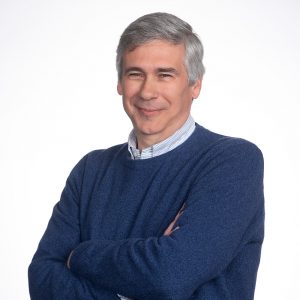
Goldfarb: You’re not forgetting anything, but I can just say, on a personal level, you make a first season and you just hope it’s going to work. You hope the world is going to embrace it, and you hope the people that were part of it are proud to be a part of it. You hope it all comes together. Again, we were making a first season of a show about making a first season of a show. Then we got to share it with the world and the world embraced it, which was really wonderful. Everyone who worked on the show I think also really embraced what we had all created together. It was really wonderful to come back for a second season. We know each other in the writers’ room. We know the actors that we were writing for in a different way than we did in season one. We got to push them or write to their strengths or also give them something they could really play with and have fun with. Then when we all we all started together in France, it was really nice. We got to be social. It was hard to be social during season one, just because of COVID. There were so many restrictions. So it really felt like, even though we were all working, it also kind of felt like a celebration. It felt like the family was back together. That was really a nice part of making the second season as well as everything Chris was talking about creatively, that we wanted to do on the show itself.
Keyser: Things that are new are always exciting. But the thing that you love about TV is that it’s ongoing and not until the second season do you feel fully like a theater company, where we’re making something and we’re in each other’s lives for a while. That was nice.
ATL: The scenes in France do feel drastically different from what’s happening in Boston. Is that true also of the mood on set when you’re on location like that?
Goldfarb: We all really enjoyed being in France. It was pretty magical. It was 110 degrees every day, and France was the COVID capital of the world at the time that we were shooting there, so there were stresses. That chateau didn’t have air conditioning, but we all loved being there, and we all loved being together. It was the first time we were all together since the show had come out. That was really, really special. That said, because we block shot, we shot those three episodes in France and then we opened up in Boston, it was sort of strange, because we shot a couple weeks in Boston without Julia and Paul. Even though what was going on in Boston is in juxtaposition with what was going on in France, and it was frenetic and they were stressed, the characters, it was really wonderful to be with all of them too. It felt like a real celebration to be back with Brittany and Fran and Bob Joy. That wasn’t that different, actually.
Keyser: I don’t know if the audience will notice this, but we wrote and shot it differently in France. The pace of the show is a little different. In France, the scenes are a little longer and slower. We go back and forth between those things. We tried to take advantage of the feeling of being in this luxurious world that Julia doesn’t want to leave. When you see the first episode, you’ll see that she feels like a Lotus eater, she says. She’s just in a daze because she’s so in love with the sights and the smells and the tastes of France. We wanted an audience to feel the same thing. So the show is shot and feels a little bit different in those scenes that take place somewhere outside of GBH.
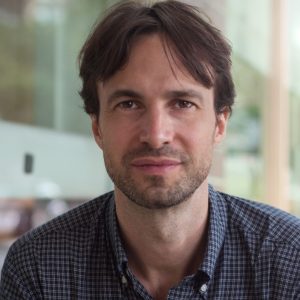
ATL: There’s also a different focus on the food, and I remember speaking to your food stylist for season one. What is your role when it comes to the food? Do you guys get to try a lot of stuff, and is that central to the plot, or is that just part of the script and that’s not really part of the production for both of you?
Keyser: No. We start with the scripts. We know in our scripts that food is one of the attractive things about the show. Every episode, we identify some moments where there is fun cooking or eating to be done. We then present that to the whole production team led by Christine Tobin, who is our food stylist and the head of our kitchen. She’ll often give us advice and say, oh, you’ve identified this dish, maybe we should cook this instead. There’s a huge feast in France and we had big storyboards about what that would be. We identified some dishes, but not all of them. Christine and we sat together and talked about the way they would mix and match. There’s a lot of collaboration on that part. Then really critically, we have to be on set to eat a lot of the food. [laughter] Very important.
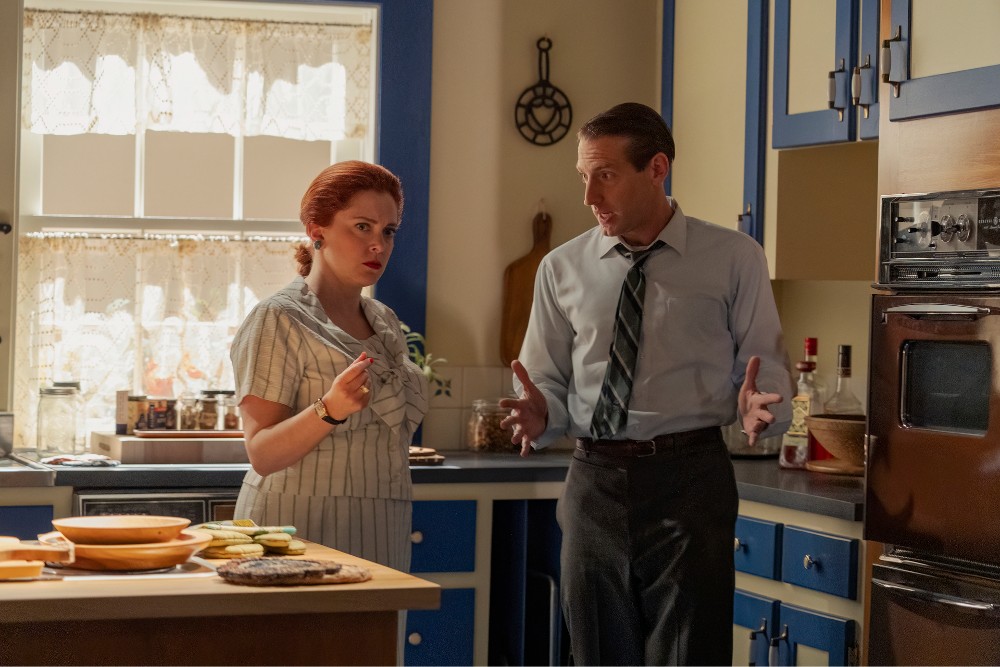
ATL: I was also excited to see some new faces in the cast, particularly Rachel Bloom. I think she’s an especially interesting choice, because she has this real comedy background. While there’s a certain pep and wittiness to the way that her character here talks, it is a dramatic role.
Goldfarb: Yeah, and it was interesting, because you’re exactly right. She is such a skilled comic actor and she really showed up and wanted to… I mean, she’s very funny on the show and she gets her laughs and she’s wonderful, but she did not play it like she was in a comedy. She came up in the theater, she loved all the theater actors that are on our show. She’s a huge admirer of Sarah’s, and she really wanted to be present and in the moment and play the scenes for real. She was really delightful and we were really lucky to have her.
Keyser: We should mention, obviously, that she wasn’t alone. We got Hannah Einbinder to come in and spend time with us on the show. And Stockard Channing did, and Danny Burstein.
Goldfarb: Yeah, I think Danny’s dynamic with Bebe is pretty special. I think there’s magic with the two of them. That was really fun for me to see.
ATL: Do you have plans already mapped out for Season Three and beyond if news continues to be good?
Goldfarb: We do, yeah! We don’t have scripts or anything like that, but, again, because we have Julia’s life to draw from, even as we were filming Season Two, ideas would pop into our heads and we would just discuss them at dinner. “What do you think of doing this, or what do you think of doing this?” There are lots of things that we would love to dramatize, especially as we get further into the sixties. It feels like a really ripe terrain, so we’re excited to hopefully get to do more of it.
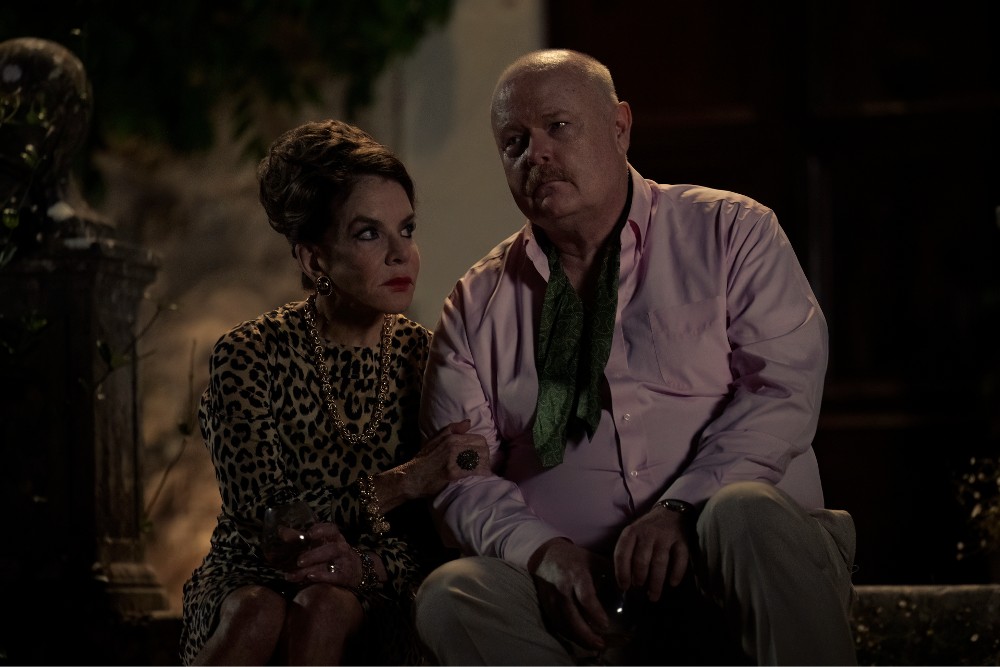
ATL: How do you feel about the way that the show is dropping, with three episodes to start and then one per week in an age where there’s so much that’s streaming that’s coming out all at once? Do you like the flow of this rollout?
Keyser: Maybe because I’m older, I actually particularly like this. I like the idea that episodes live in the world. Look, people eventually can stream the whole thing when it’s all over. You can wait till the end and watch all eight episodes if you want, one after another. But if you don’t want to, you can watch three, and then one and one and one and one and one, and live those episodes and think about them. There’s something for me about eight episodes passing that means that the details of episodes four and five and six get lost, because an audience remembers what happens in the beginning and a few things in the middle and something at the end. So there’s something very nice about the show living that way. The HBO way of dropping shows. It turns out, and we wrote it for this reason, that the first three episodes are a kind of chapter. They are Julia and Paul’s time, with some others as well, in France. So the three, then five single episodes after that, feels exactly right. And then to have it happen during the holiday season, I think also feels really nice. It’s when people are moving back inside and gathering with family, and probably cooking more than they have for a while. You never know how it’s going to turn out with regard to the audience. But if somebody said to me, how would you want to launch your own show, I would have said, let’s not drop them all at once. Let’s let this live for a while.
Goldfarb: This is how we did it last year. We dropped the first three, and then one a week. Selfishly, it just means there are six weeks where the show is alive, and I hear from old friends or colleagues. We spent a lot of time working on it, and working on each individual episode, as Chris was saying that sometimes things get lost in the middle. It’s a year and a half’s work at least to put the season together, so it’s nice that we just get to enjoy it for a little bit as opposed to it coming and then the weekend’s over. Especially going through Thanksgiving and Christmas and Hanukkah, it’s really nice.
Keyser: You don’t want to be like a Thanksgiving meal where you take two days to cook it and people take fifteen minutes to eat it. There’s something nice about stretching it out a little bit.
ATL: I like the idea of a good holiday accompaniment. What kind of responses have you heard to the show, and do you think there’s a particular audience that it’s really speaking to more than something else?
Goldfarb: The feedback I’ve gotten has been really wonderful. Obviously, it would have been nice to have been more of a contender in awards season, but the reception to the show critically and the feedback we’ve gotten from people that knew Julia has been incredible. I think the second act nature of the show has really spoken to a lot of people, women in particular, and that’s been really moving. I’ve heard from a number of people. I’m thrilled with the reception the show has gotten and I hope they all come back and I hope they tell their friends, and I hope even more people find it.
Keyser: We all know that it’s a question that’s going to get answered over time, and it’s not just about this show. There are so many conversations about the streaming model and the way things are made. The question of, what does it mean for shows to air briefly and go off the air for a really long time before they come back again, and how do audiences feel about that. We know how they feel about it. When the show is Stranger Things or The White Lotus or something like that. But how do they feel about it for everything else? That’s an experiment that we’re in the middle of, and one that we’re going to find out the answer to in our own particular case. It’s hard to know whether people miss it and want it, whether people forget it. I hope not. I think we had a passionate audience and that tends to help. People didn’t just watch it and say, oh, that was okay. It was one of the things I watched. People tended to be deeply connected to it, because it’s an emotional show. It’s a light show, but it taps into emotional things. So we’ll see. We’ll see what happens. We did our best, and we appreciate the effort that Max is putting into it now. We’ll just keep our fingers crossed.
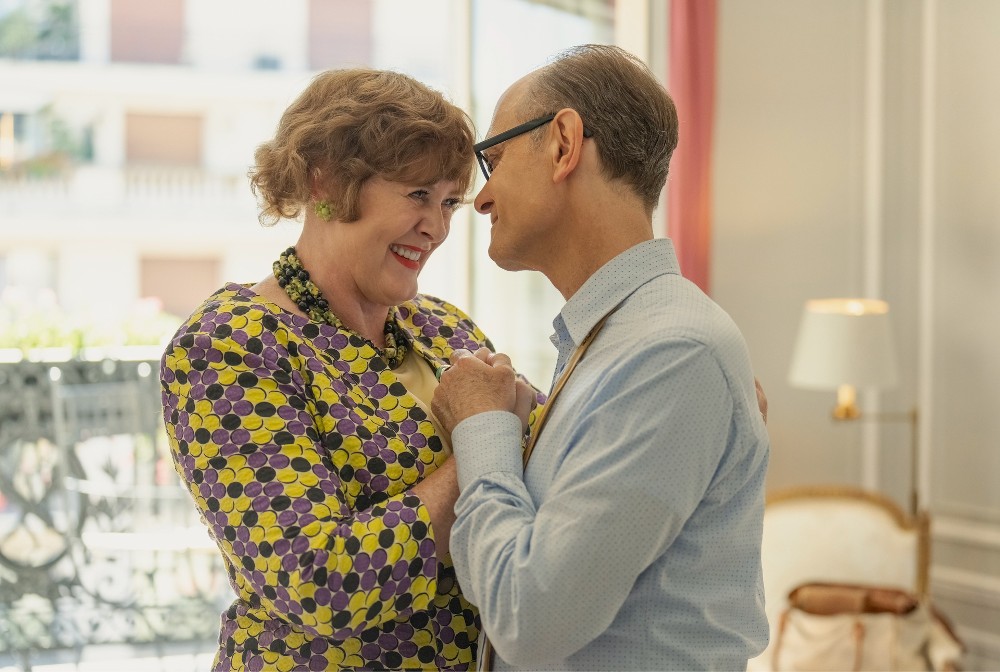
Goldfarb: I think the show builds on the first season. I think the second season is every bit as good as the first season or maybe even, I don’t know if it’s better, but I know the show has grown. We get to go to France, but I also think thematically, it’s grown, and the stories it’s telling are more complicated. I’m excited to put it out into the world, and I know Chris and I are proud of it.
Keyser: I hope people feel like it’s changed and it’s the same, which is what you want to do, right?
ATL: Especially around the holidays, I think that’s exactly the right kind of vibe. Before I let you go, I was looking back at your credits, and I found a show that you both worked on together, which is more stressful than Succession and nothing like Julia at all: Tyrant. I don’t know how well-remembered that show is. I remember it being very intense and really dramatic. What memories do you have of that show and its legacy?
Goldfarb: Well, for me, Chris was the showrunner of the show, and he hired me and I lived in his house for twenty weeks. I lived in New York, and it was the best experience I had ever had in a writers’ room. I learned a lot. I was nervous about writing an episode of Tyrant. I didn’t know if it was in my toolbox of tools, and I had a great time working on it. Then I got to go to Budapest, and Peter Weller directed it, and I had this incredible adventure on set. It was when I really fell in love with television writing and realized I wanted to do more of it, and [that] was the beginning of my friendship with Chris.
Keyser: I loved doing that show. I made that with Howard Gordon and Glenn Gordon Caron. It was way ahead of its time, and I think also never going to happen again. Maybe not a show like that, set in the Middle East and about political conflict in the Middle East. Not an easy thing to do. It wasn’t like Homeland. It didn’t come home. It was always over there. But it was at heart, about this question of, what do you do? How do you live in the face of evil? It’s a question that I think matters as much today as it did then. Maybe more, as it happens. I wish people would watch that show periodically. A lot of people did, by the way. It went for three seasons. It had a really good run, and FX was great about it. And then it ended. It’s one of the shows I’ve done that I really miss, because I think it meant something. And I met a lot of people on that show.
Goldfarb: Yeah, it was a great group of people.
Keyser: People we continue to be friends with and work with. It was not the first time Daniel and I had met, but it was the first time we got really, really close. This is the spiritual descendant of Tyrant.
ATL: I don’t think that’s true.
Keyser: No, it’s completely not. It’s completely false.
ATL: Well, I’m glad that it led to this.
The eight-episode Season 2 of the Max Original series Julia will debut with three episodes on Thursday, November 16 on Max, then the subsequent episodes premiere weekly on Thursdays through December 21.


